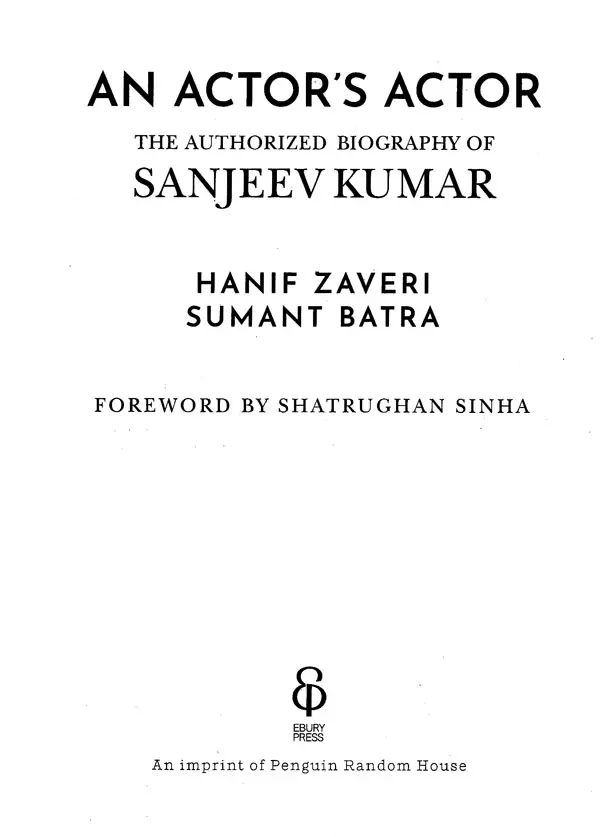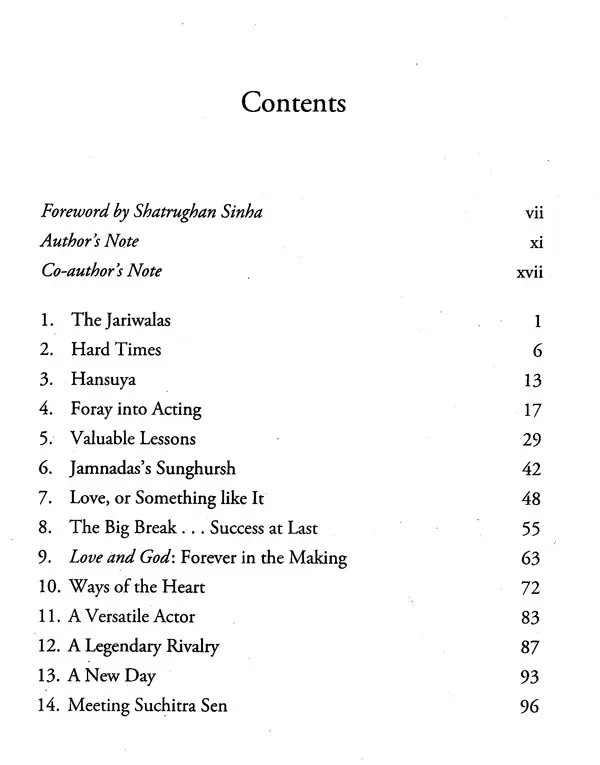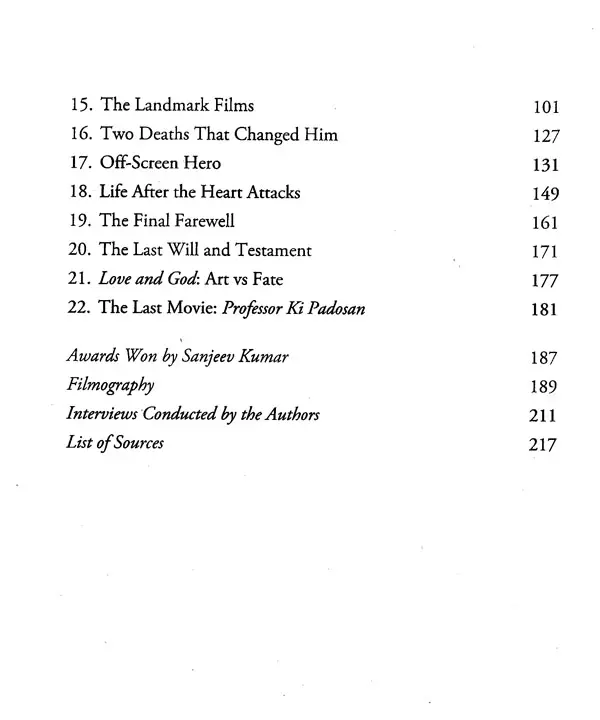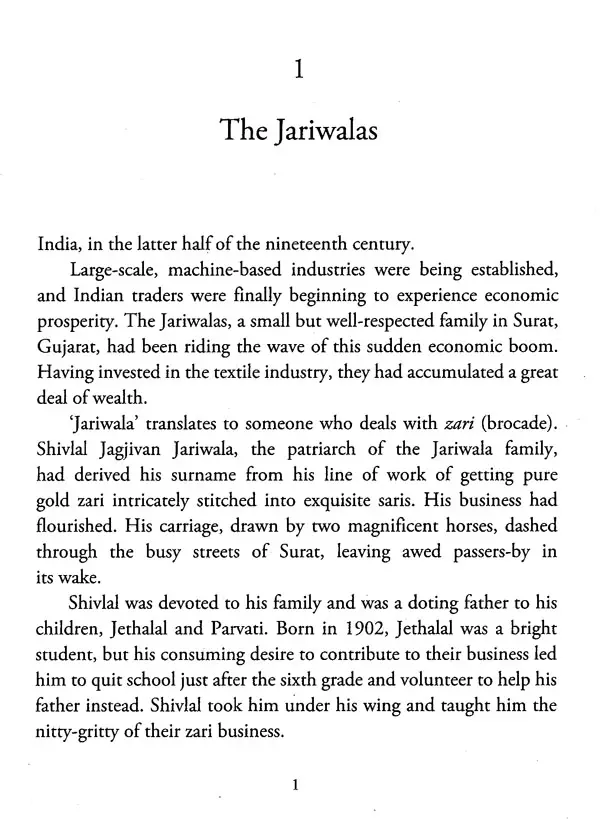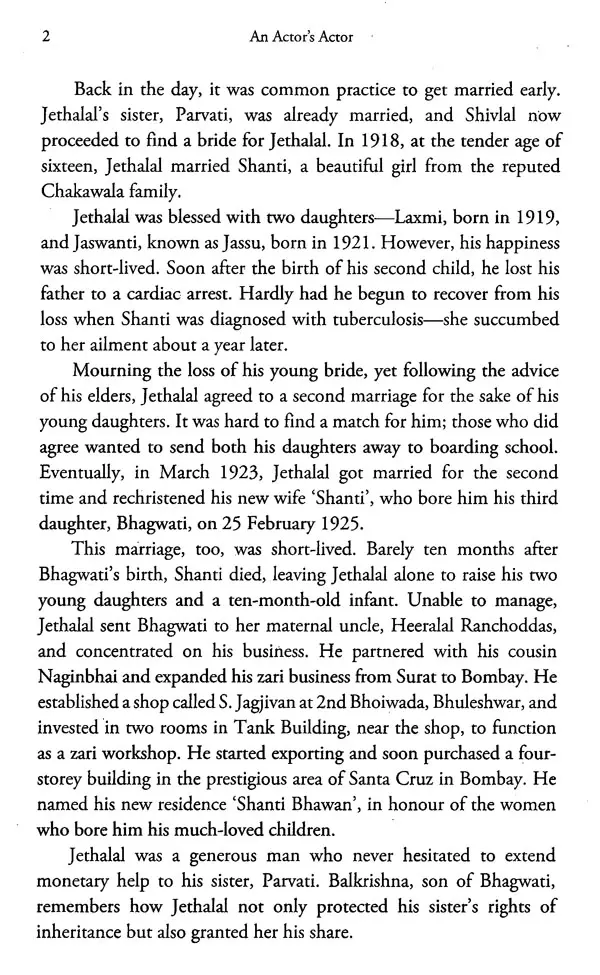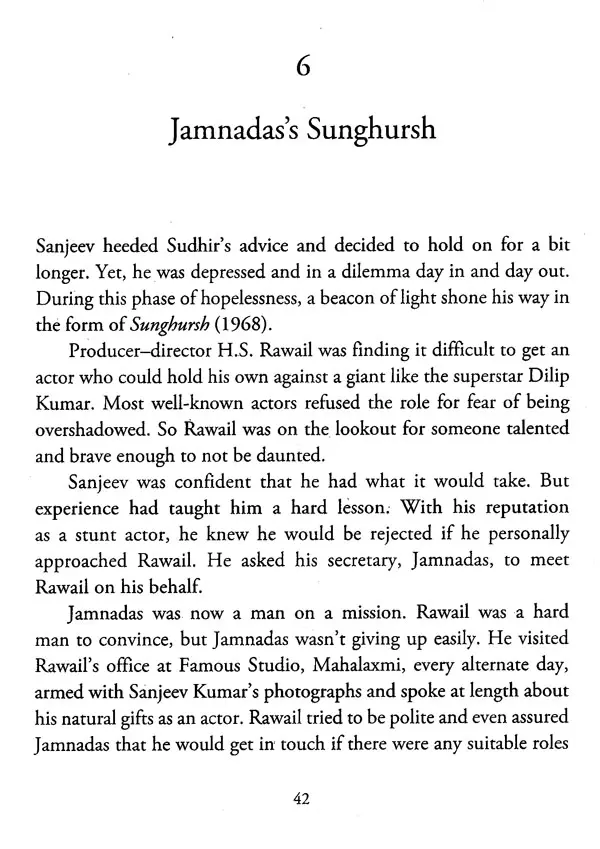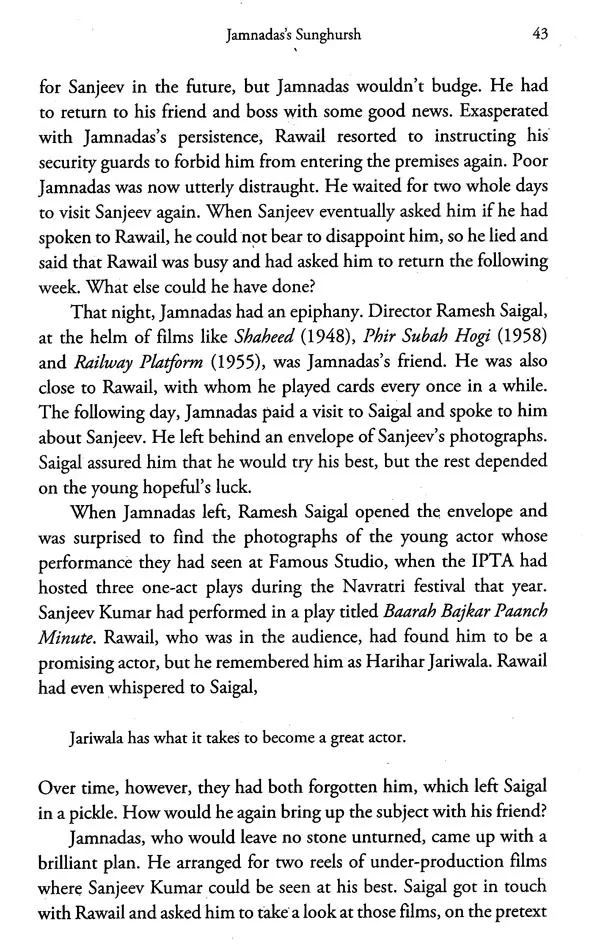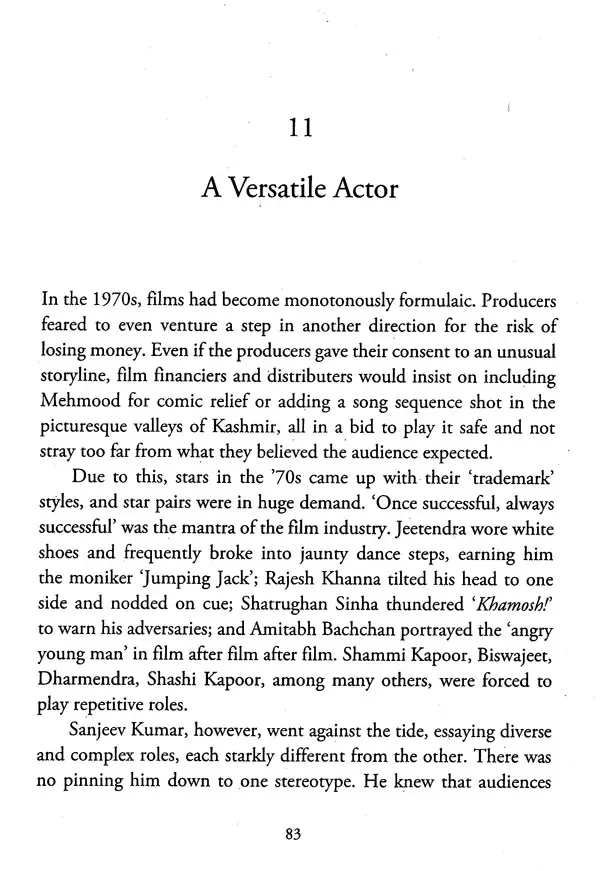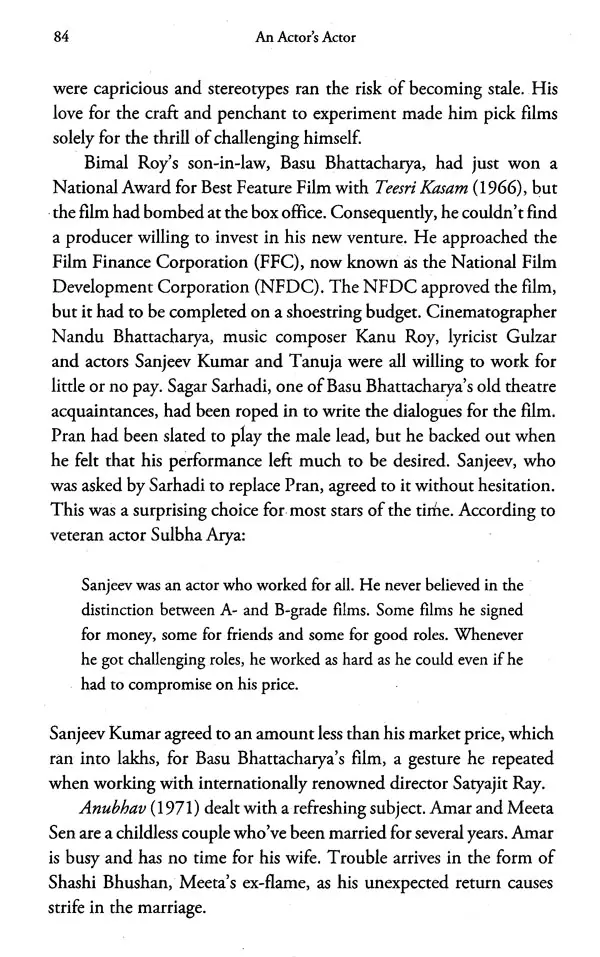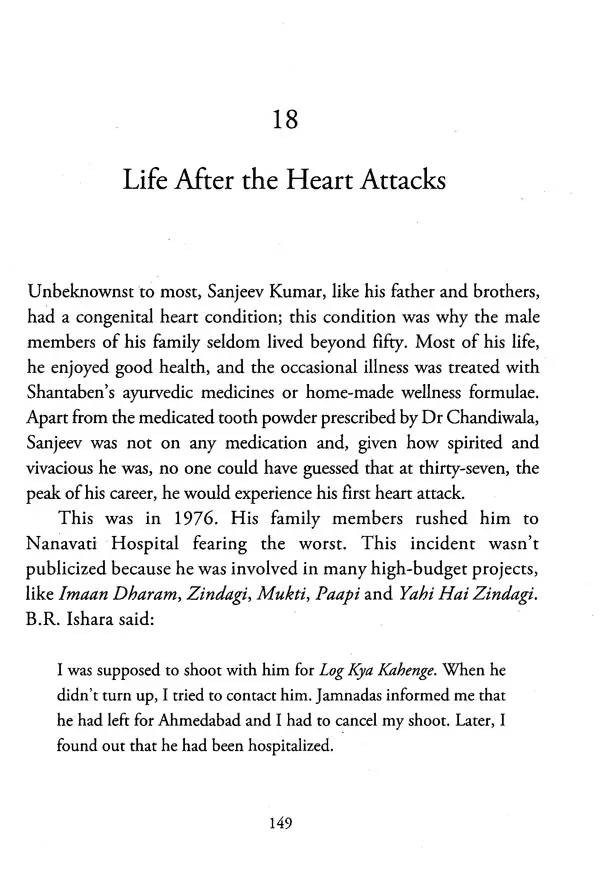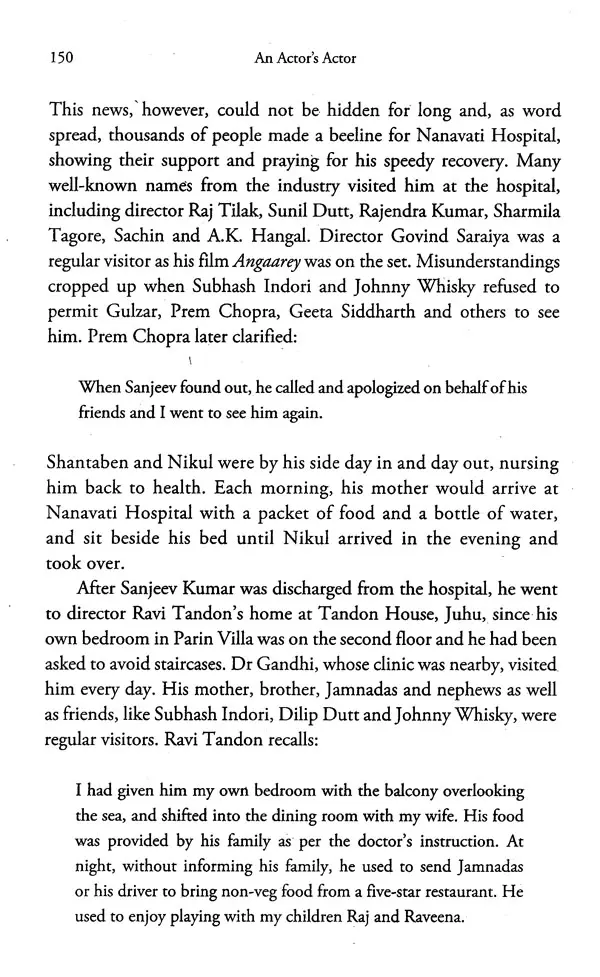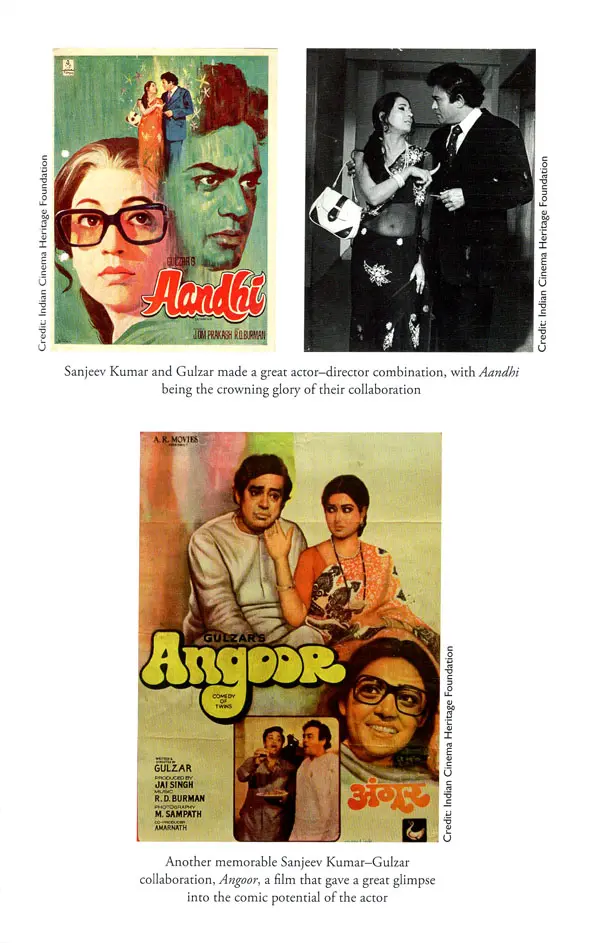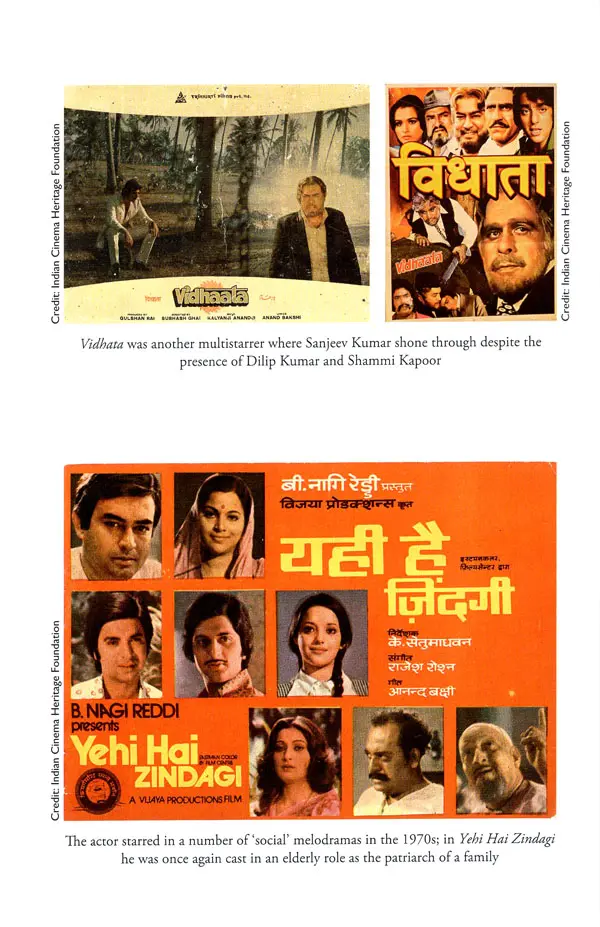
An Actor's Actor- The Authorized Biography Of Sanjeev Kumar
Book Specification
| Item Code: | UAG204 |
| Author: | Hanif Zaveri and Sumant Batra |
| Publisher: | Penguin Random House India Pvt. Ltd. |
| Language: | English |
| Edition: | 2021 |
| ISBN: | 9780670096084 |
| Pages: | 234 (Throughout Color Illustrations) |
| Cover: | HARDCOVER |
| Other Details | 9.00 X 5.50 inch |
| Weight | 390 gm |
Book Description
More than thirty-five years after his death, Sanjeev Kumar remains a role model for all aspiring actors. He could light up the screen in underpants, paunch showing, in one of Hindi cinema’s most lovable song sequences, ‘Thande thande paani se nahana chahiye’ (Pati Patni Aur Woh, 1977). Entirely unselfconscious of his image as a star, he would often be cast as the father figure to a number of his contemporaries, most famously Sharmila Tagore in Mausam (1975) and Amitabh Bachchan in Trishul (1978), or as the elderly Thakur in Sholay (1975) and yet leave an indelible mark with his presence and his acting prowess.
After starting out in B-films in the 1960s, he caught the eye in Sungharsh (1967), where the manner in which he held his own against Dilip Kumar is now stuff of Hindi film folklore. Equally adept at comedy (Angoor and Manchali, for example) and dramatic serious roles (Anubhav and Koshish), he was truly an actor’s actor.
Hanif Zaveri and Sumant Batra’s biography provides a glimpse of star’s personal and professional lives, taking off from the traditional business of the Zariwalas, his romantic involvement with some of Hindi cinema’s biggest names, his lifelong battle with loneliness and his glittering achievements on screen. An Actor’s Actor is a succinct introduction to the life and films of a star who left us tragically at the young age of forty-seven but who continues to live through his unforgettable and remarkable contribution to Hindi cinema.
Hanif Zaveri is an author, journalist, actor and playwright residing in Mumbai. he has worked as a freelance film journalist, and interviewed eminent film personalities. He is also the author of Mehmod: A Man of Many Moods.
Sumant Batra is India's leading insolvency lawyer and among the top 100 globally, as rated by Global Restructuring Review, and has worked as a senior international consultant to the IMF, World Bank Group, OECD and other development institutions. He is the author of the Indians, a coffe-table book that includes a foreword by cherir blair.
On 6 November 1985, when the call came to Chandivali studio, where I was shooting, I rushed to the second-floor apartment in Bandra, where I'd been welcomed so often with warmth and camaraderie even when I was a newcomer.
On the drive, it was tough to reconcile myself to the thought that my one true friend, philosopher and guide was never again going to give me his wise counsel or his unstinting companionship.
It is true that Sanjeev Kumar had suffered a couple of heart attacks before 6 November. But the stories that whirled around-about him having a death wish, and drinking and smoking himself to death-were untrue. After he'd been operated upon in the US, when I was there on a visit, I flew specially to Houston to see him and to spend some time with him. It was a slim Sanjeev Kumar that I met that day-he had lost much weight. Thereafter, when he returned to India, he quit smoking. He'd also drastically cut down on his drinking. He was taking care of himself, which made his death tragic and unexpected for me. It was an unfortunate genetic, hereditary condition that did him in. All the men in his family-his father, his brothers and he himself-passed away before they could hit fifty.
En route to his house, I recalled precious moments spent with him. Many years later, I recounted an incident in my biography Anything but Khamosh, written by Bharathi S. Pradhan. It was one of the many incidents that flashed before me when I was speeding down to his house on 6 November. I remembered how, when I had once needed some money very desperately for a personal reason and some best friends had turned me down after promising it to me, Sanjeev Kumar had quietly sent his secretary, Jamnadas-ji, to see me. Jamnadas-ji had carried with him what looked like video cassettes wrapped up in newspaper but turned out to be wads of currency notes that Sanjeevbhai had sent across. Unlike other acquaintances who talked of interest and terms of credit, Sanjeev Kumar lent me the money without a rupee as interest and on 'returnable when able' terms. To this day, I'm not even sure if I returned the entire amount of money, which I paid back in spurts.
We had much in common. He was born on 9 July. Promi (my wife, Poonam Sinha) and I got married on 9 July, and, of course, he was with us at the celebrations. Another common factor was that we were both notorious latecomers. We were renowned as 'Late Lateefs'. But if I reached the studios late, he fetched up even later.
We did many films together, including Khilona (1970). How could I ever forget that Sanjeev Kumar used to carry reels of my student film at the Film and Television Institute of India (FTII) to introduce producers to this 'new boy in town'? He had tried to get me into Khilona too, though it was ultimately Mumtaz's adamant stand that really got me that career-making film.
One day, tired of our tardiness during the filming of Khilona, the late and great L.V. Prasad told me, 'Since Sanjeev Kumar and you are such good friends, you go to his place and bring him with you. At least that way he will be on the sets on time.' But when I would reach his second-floor flat, I would find Sanjeevbhai still relaxing with his tea and cigarette. He would say, 'We'll leave in a while,' and ask me to relax and have some chai. He was the hero of the film and I an absolute newcomer. But with such 'encouragement', I began to reach the sets even later than usual. Neem pe karela.
Every day, the two of us would come up with a new excuse for turning up late. One day we would tell L.V. Prasad, 'Today, there was a bus accident at Mahim Church.' The next day, it would be, `Two taxis had collided outside Mahim Church.' An exasperated L.V. Prasad finally told us, 'If you can't change the situation, at least change the location. Otherwise, whatever's happening every day is always outside Mahim Church.'
Those were such fun, hilarious times.
When my car reached Pali Hill, I ran up the steps, but it was too late. Sanjeevbhai was no more, and I stood numbly against the wall, looking at his body constantly for eight to ten hours. I don't think I've ever stood in one place for so long in my life, but I was stunned and in sorrow. He was embalmed in front of me, and I followed his body to his funeral.
My wife fainted that day. It was a personal loss for her as well. Whenever she and I fought, as couples are wont to do, and she would cry or threaten to leave me, the only place she would think of going to was `Sanjeevbhai's place'. She considered him her guardian and placed all her emotional trust in him. Though many people called him Haribhai, till the end both of us called him Sanjeevbhai, because we only got to know him after he had become Sanjeev Kumar. So I didn't want to resort to the filmi familiarity of calling him Haribhai. However, as Rabindranath Tagore said, The depth of friendship does not depend on the length of acquaintance.'
I still miss him, my whole family does. He was my sons'-Luv and Kush's-favourite mama.
I do accept that the show must go on. But when I look at the show around me today, at the vast world of entertainment that has opened up, I can't help but feel wistful at how invaluable his contribution would have been to the wealth of feature films, Web series and short films that are currently being made.
Yes, the show must go on and it has gone on. But without Sanjeev Kumar, the show is not what it could have been, would have been and should have been.
**Contents and Sample Pages**
